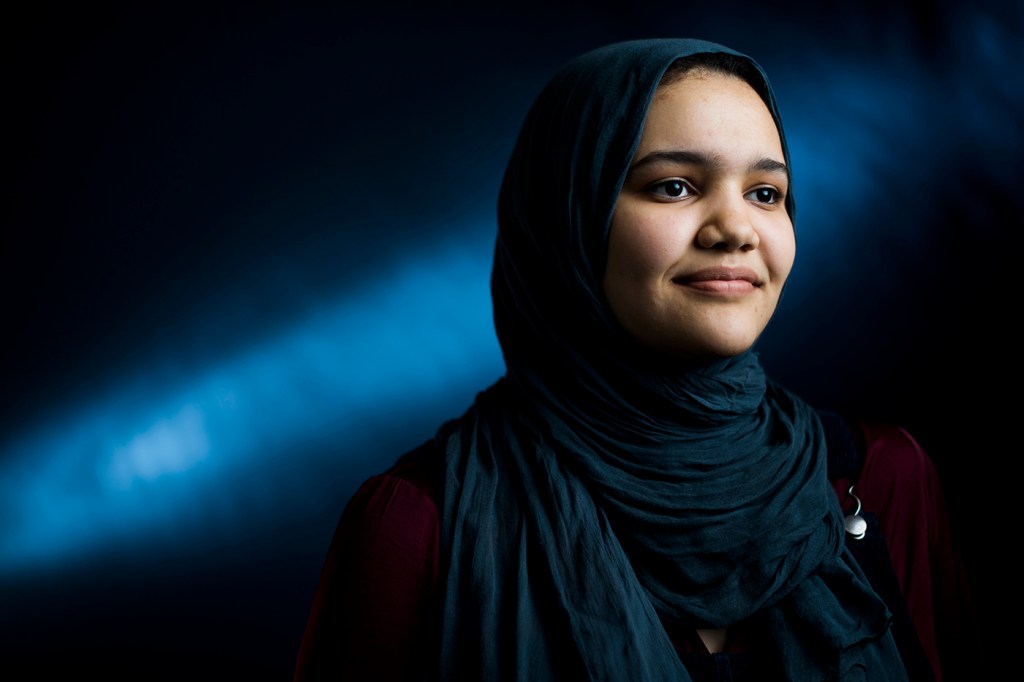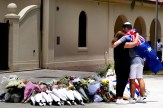Northeastern University student is a leader in UNICEF fighting to ensure good health and well-being around the globe

Bouchra Benghomari’s mother remembers growing up in Algeria when members of the United Nations Children’s Fund—better known as UNICEF—delivered much-needed vaccinations to her home.
“If it wasn’t for UNICEF, my mom wouldn’t be here,” says Benghomari, who is studying cellular and molecular biology at Northeastern University.
The organization, which works in more than 190 countries and territories to protect and defend the rights of children, has proven central to Benghomari’s life as well.
When she was a junior at Cambridge Rindge and Latin School, Benghomari started a UNICEF chapter that quickly became one of the school’s most popular clubs, she says. She currently serves as the youth representative of UNICEF USA New England, a position she’s held since 2016, in which she oversees more than 50 high school and university UNICEF clubs in the northeastern part of the U.S.
“It’s a real full-circle moment,” Benghomari says, smiling at the recollection of the role UNICEF played in her life.
Benghomari has long striven to help others the way UNICEF helped her mother so many years ago.
Her mother, Khadidja Boutaleb, immigrated from Algeria to the United States in the late 1990s, fleeing a civil war in her home country. She was one of 55,000 people annually who secured an immigrant visa through a lottery system that was established by the Immigration Act of 1990.
“It was literally a game of chance,” Benghomari says. “If it weren’t for chance, I’d be back in Algeria, and I wouldn’t have any of the opportunities I have today. I feel like there’s a reason I’m in this position; I’ve made it my life’s purpose to give back.”
Benghomari first got a taste for activism as a member of her high school’s model U.N. club. She got a thrill from debating with her peers and working through big, global issues together, she says.
But the exercise created a certain dissonance she couldn’t shake. After one mock U.N. summit, she went home and it struck her: All of the critical thinking, all of the solutions she and her peers created didn’t lead to any real change in the countries they were supposed to be representing.
So, at 16 years old—before she could vote in a U.S. election—Benghomari decided she wanted to do something that would yield concrete results. She started a small UNICEF club at her school and encouraged her classmates to get involved.
“I was passionate about wanting to get involved, politically,” she says, “but I was worried that because I was so young, there wouldn’t be anything I could do.”
The UNICEF club provided a way in for her and her classmates. Benghomari helped start the Boston UNICEF Congressional Action Team (a team that was later absorbed into UNICEF UNITE). Within that team, she met with members of Massachusetts’ congressional delegation to urge them to vote for legislation that addressed human rights issues, Benghomari says.
During her senior year of high school, Benghomari was nominated to the UNICEF USA National Council, a body composed of six high school students and six college students from across the country that seeks to raise money for the more than 600 UNICEF clubs in high schools and colleges in the United States.
That same year, she was named a youth representative for the organization’s New England region—a position she still holds, three years into her time at Northeastern. In addition to overseeing the high school and college UNICEF clubs in the northeast, she takes an active role in encouraging youth to get involved in UNICEF in their own communities. She still advocates for political policy that aligns with the human rights goals of the United Nations.
In 2015, the U.N. set 17 sustainable development goals to meet by 2030 in order to address global poverty, hunger, health, climate action, and economic growth, among other issues.
Benghomari says she uses all 17 issues to guide her decisions within UNICEF, but one in particular hits close to home when she thinks about her mother’s story and how it intertwines with her own. Benghomari is focused on a goal to ensure good health and well-being for people across the globe. It’s the third U.N. goal.
Specifically, Benghomari wants to help prevent the spread of infectious diseases, such as tuberculosis and Ebola.
To that end, she directs the Northeastern Global Health Forum, and is leading a research project on tuberculosis at the Harvard T.H. Chan School of Public Health.
Benghomari plans to pursue both a medical degree and a doctorate, and eventually serve as an advisor to the U.S. Centers for Disease Control and Prevention.
“Hear me out; I’m dreaming big,” she says with a quick laugh, “but when you give health to a people, you give health to the whole world.”
For media inquiries, please contact media@northeastern.edu.





